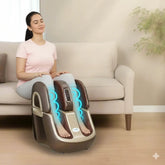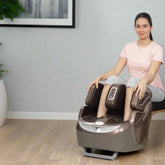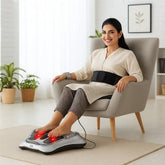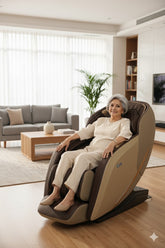Are electric heating pads good for you?
Introduction :
In the quest for comfort and relief from aches and pains, many of us turn to various forms of heat therapy. Among the myriad of options available, electric heating pads have stood out as a popular choice for easing muscle tension, reducing stiffness, and even improving blood circulation. But as with any remedy, it's important to question its efficacy and safety: Are electric heating pads genuinely beneficial for your health, or could they be causing more harm than good? This blog post delves into the world of electric heating pads, examining their advantages, potential drawbacks, and how to use them safely to ensure you reap the benefits without unintended consequences. Whether you're a long-time user or considering purchasing your first pad, join us as we explore the science and opinions surrounding electric heating pads and their role in our well-being.
So, Are electric heating pads good for you?
Electric heating pads can be beneficial for many people, offering several health and therapeutic benefits when used correctly. Here’s a breakdown of the advantages and considerations:
Advantages
-
Pain Relief: Electric heating pads are effective at relieving pain associated with muscle strains, sprains, and stiffness. The heat helps increase blood flow to the area, which can reduce pain and accelerate healing.
-
Muscle Relaxation: Applying heat to tense or cramped muscles can cause them to relax, reducing discomfort and improving mobility.
-
Improved Blood Circulation: Heat therapy, including the use of heating pads, can improve blood circulation. Enhanced circulation aids in the recovery of muscles and joints after injury.
-
Flexibility: Regular use of heating pads can help increase the flexibility of muscles and joints, potentially reducing the risk of injury.
-
Convenience and Control: Electric heating pads offer the convenience of use at home and allow for control over the temperature and duration of therapy.
Considerations and Safety Tips
-
Burn Risk: Incorrect use of heating pads, especially at high temperatures or for extended periods, can lead to burns. It’s crucial to follow the manufacturer’s guidelines and use the pad correctly.
-
Not for All Conditions: In some conditions, such as acute injuries or certain skin conditions, heat may exacerbate the problem. It’s important to consult with a healthcare provider before using a heating pad in these scenarios.
-
Electrical Safety: Since these devices are electrical, there’s a risk of electric shock or fire if the product is damaged or improperly used. Regularly inspect the pad for damage and follow all safety instructions.
-
Duration of Use: Long-term exposure to heat on a single body part is not recommended. It’s generally advised to limit sessions to 15-20 minutes at a time.
-
Underlying Conditions: Individuals with certain medical conditions, such as diabetes or vascular diseases, which can affect sensation, should use heating pads with caution or under medical advice to avoid burns.
Is it OK to sleep with an electric heating pad on?
Sleeping with an electric heating pad is generally not recommended due to the risks it poses, including burns and fire hazards. While a heating pad can be very effective for relieving pain and discomfort, using it safely is crucial. Here's why you should be cautious about using an electric heating pad while sleeping:
Risk of Burns- Prolonged Exposure: Your body's sensitivity to heat decreases during sleep, increasing the risk of burns from prolonged exposure.
- Lack of Movement: Staying in one position for a long time can also increase the risk of burns if the heating pad is trapped against the skin.
Fire Hazard
- Overheating: Electric heating pads can overheat if used for too long, especially if covered by blankets or if the heating pad is old and malfunctioning.
- Electrical Short Circuits: There is also a risk of electrical short circuits, which can lead to fires, especially with older or damaged pads.
- Timed Shutoff: If you decide to use a heating pad for comfort as you fall asleep, choose one with a timer that automatically shuts off after a certain period (usually 15 to 30 minutes).
- Low Heat Setting: Use the lowest heat setting to minimize risks.
- Other Heating Options: Consider alternatives like microwaveable heat packs or hot water bottles, which do not carry the same risks as electric heating pads. However, these should also be removed from the bed before falling asleep to avoid overheating or burns.
Best Practices
- Always follow the manufacturer’s guidelines for use.
- Inspect the heating pad regularly for signs of wear or damage.
- Consider using the heating pad to warm the bed before getting in, then turning it off and removing it before you fall asleep.
Consultation with Healthcare Providers
If you're relying on a heating pad regularly for pain relief, especially to the extent of wanting to use it overnight, it might be beneficial to consult with a healthcare provider. They can offer advice tailored to your specific health needs and may suggest alternative pain management strategies that are safer to use during sleep.
In summary, while the comfort and pain relief provided by electric heating pads are valuable, safety should always come first. It's better to err on the side of caution and not sleep with an electric heating pad turned on.
Do heating pads use much electricity?
Heating pads typically do not consume a significant amount of electricity relative to many other household appliances. The energy usage of a heating pad primarily depends on its wattage and the duration of use.
A standard heating pad might consume around 50 to 100 watts of electricity while in operation. If used for a short period each day, such as an hour or two, the electricity consumption remains relatively low.
However, prolonged and frequent usage over extended periods could lead to a noticeable increase in electricity consumption. Nonetheless, compared to many other electrical devices commonly found in households, heating pads generally have a modest impact on electricity bills.
It's important to note that newer models of heating pads often come equipped with energy-saving features, such as automatic shut-off timers, which can further reduce energy consumption.
Calculation on electricity consumption of Heating pads :
Assumptions :
- Heating pad wattage: 60 watts
- Duration of daily use: 3 hours
- Cost of electricity: $0.12 per kilowatt-hour (kWh) (approximately ₹9.95 per kWh with the current exchange rate of 1 USD to 82.96 INR)
-
Energy Use Calculation:
- Energy Use per Day (kWh) = (Heating pad wattage × Duration of use per day) / 1000 = (60 watts × 3 hours) / 1000 = 0.18 kWh/day
-
Cost Calculation:
-
Cost per Day (USD) = Energy Use per Day (kWh) × Cost of electricity (USD/kWh) = 0.18 kWh/day × $0.12/kWh = $0.0216/day
-
Daily Cost (INR) = Daily Cost (USD) × Exchange Rate (INR/USD) ≈ $0.0216 × 82.96 INR/USD ≈ ₹1.79/day
-
-
Monthly Cost:
- Monthly Cost (INR) = Daily Cost (INR) × Number of days in a month ≈ ₹1.79/day × 30 days ≈ ₹53.70
So, using the electric heating pad for 3 hours daily at a wattage of 60 watts would cost approximately ₹53.70 per month, considering the current exchange rate of 1 USD to 82.96 INR and the assumptions mentioned.
Conclusion on Are electric heating pads good for you :
In conclusion, electric heating pads offer numerous benefits and can be a valuable addition to your self-care routine. They provide effective relief from various types of pain, promote muscle relaxation, and offer therapeutic benefits for conditions like arthritis and fibromyalgia. With their convenience, cost-effectiveness, and versatility, heating pads are a practical solution for managing discomfort and enhancing overall well-being.
While electric heating pads are generally safe to use, it's crucial to follow safety guidelines and avoid prolonged or improper usage, especially when sleeping. Always consult with a healthcare professional if you have any concerns or underlying medical conditions.
Additionally, while heating pads do consume electricity, their energy usage is minimal compared to many other household appliances. With proper usage and energy-saving features, such as automatic shut-off timers, the impact on electricity bills remains modest.
Ultimately, electric heating pads can be a beneficial tool for promoting relaxation, relieving pain, and improving quality of life. Incorporating them into your self-care routine can contribute to a more comfortable and rejuvenating experience.











